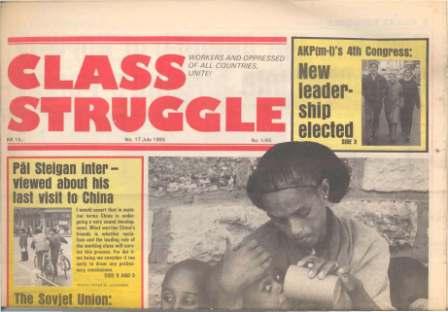
First Published in English: Class Struggle, No. 17, July 1985.
Transcription, Editing and Markup: Sam Richards and Paul Saba
Copyright: This work is in the Public Domain under the Creative Commons Common Deed. You can freely copy, distribute and display this work; as well as make derivative and commercial works. Please credit the Encyclopedia of Anti-Revisionism On-Line as your source, include the url to this work, and note any of the transcribers, editors & proofreaders above.
The fourth congress of AKP (m-l) was held in December 1984. On the Congress agenda was adoption of a new General Program of the Party, some smaller revisions of the party’s constitution and finally, election of the Central Committee.
Adoption of the new General Program was preceded by almost two years of party discussions. Two topics were particularly focused in the discussion: socialism and the liberation of women.
To this day, socialist revolutions have been successfully carried through only in countries very unlike Norway in economic structure and political tradition. It is necessary to sum up both positive and negative experiences in the history of socialism. Further, it is necessary to decide which principles and experiences are generally applicable to all socialist revolutions and socialist societies, and which have to be modified fist society and tailored to the specific conditions in different countries.
The chapter on socialism in the new General Program states that historical experience teaches the necessity of armed revolution against the bourgeoisie. Regardless of the will of the people, the bourgeoisie will not resign power and privileges unless they are forced to do so.
The program also states that the state form of socialism has to be the dictatorship of the proletariat, based on the class alliance between the leading working class and the rest of the working people.
One main point in the party discussions has been the importance of democracy for the people in socialist society.
Democracy is necessary to mobilize the working class and the rest of the working people as the rulers of the state, and to pave the way for the abolishment of the division of labour. Democracy of the working class and the people, not administrative measures from the state, also must be the main method in the suppression of the bourgeoisie.
The role for the communist party in socialist society is another important point. The role of the party must be that of the vanguard of the working class in the struggle to develop socialism into communism. The communist party must remain a critical element in society, with strong roots among the working class and the working people. The party must fight against signs of degeneration and the formation of a new privileged class in socialist society.
The new General Program closely links the liberation of women with the development of communist society. The struggle of women for liberation is one of the forces in the struggle for communism. Socialism will not automatically solve the women’s question and do away with all kinds of discrimination and oppression of women. But socialism will create a new foundation for the struggle, making it possible to build the economic and political conditions for the full liberation of women. To carry this through, a strong, independent, organized Women’s movement will be necessary.
50% of the memberships of the newly elected Central Committee of the party are women, and 50% belong to the working class. Pal Steigan, who has been leading the party for 9 of the twelve years of its existence, resigned his leadership, but remains a member of the central committee. Steigan was warmly thanked by the congress for his hard and inspiring work during these 9 years. The new leader of the party is Kjersti Ericsson. Political deputy leader is Jorun Gulbrandsen, and organizational deputy leader is Arne Lauritzen.